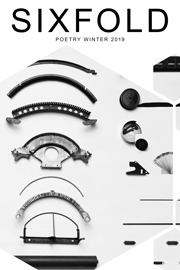
Poetry Winter 2019 fiction all issues

whitespacefiller
Cover Florian Klauer
Meli Broderick Eaton
Three Mississippi
& other poems
Andrea Reisenauer
What quiet ache do you wear?
& other poems
Alex Wasalinko
Two Dreams of Vegas
& other poems
AJ Powell
The Grammar Between Us
& other poems
Emma Flattery
Our Shared Jungle, Mr. Conrad
& other poems
Nathaniel Cairney
The Desert Cometh
& other poems
Sarah W. Bartlett
Unexpected
& other poems
Abigail F. Taylor
Jaybird by the Fence
& other poems
Brandon Hansen
Bradley
& other poems
Andy Kerstetter
The Inferno Lessons
& other poems
Michael Fleming
Space Walk
& other poems
Richard Cole
Perfect Corporations
& other poems
Susan Bouchard
Circus Performers
& other poems
Edward Garvey
Nine Songs of Love
& other poems
Mehrnaz Sokhansanj
Sea of Detachment
& other poems
Jeffrey Haskey-Valerius
Aftershock
& other poems
Claudia Skutar
Homage II
& other poems
Donna French McArdle
Knitting Sample
& other poems
Megan Skelly
Puzzle Box Ghazal
& other poems
Tess Cooper
Charged
& other poems
Greg Tuleja
Auschwitz
& other poems
Catherine R. Cryan
Raven
& other poems
Nathaniel Cairney
Flight Ghosts
They emerged as I knelt
to weed the driveway’s edge,
wounded
from a decade-ago war,
waiting to be flown across an ocean
to a myth called home,
clean-shaven,
unblinking
as if they were in a lobby
instead of the belly of a metal war beast.
All were broken
and some burned,
like three boys who swallowed bomb fire,
pink skinless faces,
backs on tables,
motionless,
masks over eyes,
tubes in throats,
oxygen bleeding into them,
chests lifting, then falling,
then lifting again.
Others huddled in shadows,
could-have-been college sophomores
in leg casts,
arm slings,
white gauze eye patches,
carrying crutches,
which could be forgotten,
and other things
which could not.
Confession, Aisle 37
Forgive me for failing
to realize how much safer it is
to be a barely grown boy
in khakis and a white shirt,
your bandages hidden,
just one more second-class passenger.
Forgive me for forgetting
you are a mother’s son
who was ordered
to hunt other mothers’ sons
in a Fallujah foyer
when a boy in pajamas,
about ten years old—
an age you remember well—
sprang from shadow,
carving knife in his small fist,
and plunged pain into you,
a man with a rifle.
Forgive me for being nowhere
near qualified to console
as you whisper confession,
your deep voice razored
by a broken heart’s edge,
your reality
shattered
by the cold uncertainty
of which blame
is yours to bear
and which blame
is mine.
The Desert Cometh
His desert
had more mountains
than mine
but the day’s
last light
was the same—
wavering orange
and bleeding red,
as if the sky knew
who was dying
and what to do
with the dead.
Outside the Parliament Building
Red spires spike a white sky.
Flecks of gray swirl between them,
a thousand birds.
Ten thousand more hunch
near the river’s edge.
The building takes your breath away,
magnificence conjured
to contain hollow spaces
like ornate halls and rib cages
where hearts beat
inside angry men who play at mirrors—
reflecting, so they say,
the people’s wish
for protection
from shattered countryless women
and men who look nothing like them.
So far, they have drawn lines with words.
It is important to appear civilized.
But exclusion and fear
are volatile ingredients.
There has never not been a time
when that particular mixture
hasn’t exploded.
This time, everyone tells themselves,
it will be different.
Nathaniel Cairney lives with his family in Belgium, where he writes, cooks, and hosts a podcast about Belgian beer. Originally from the U.S. Midwest, his poems have been published in Sixfold, California Quarterly, Illya’s Honey, and others. He holds an MA in English Literature from Kansas State University.
lives with his family in Belgium, where he writes, cooks, and hosts a podcast about Belgian beer. Originally from the U.S. Midwest, his poems have been published in Sixfold, California Quarterly, Illya’s Honey, and others. He holds an MA in English Literature from Kansas State University.